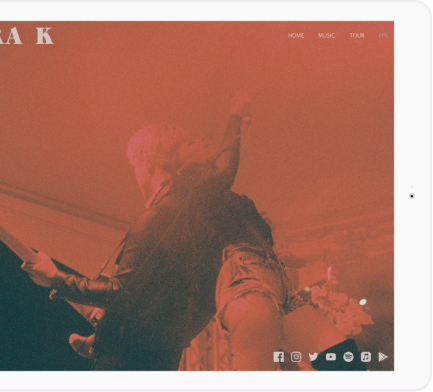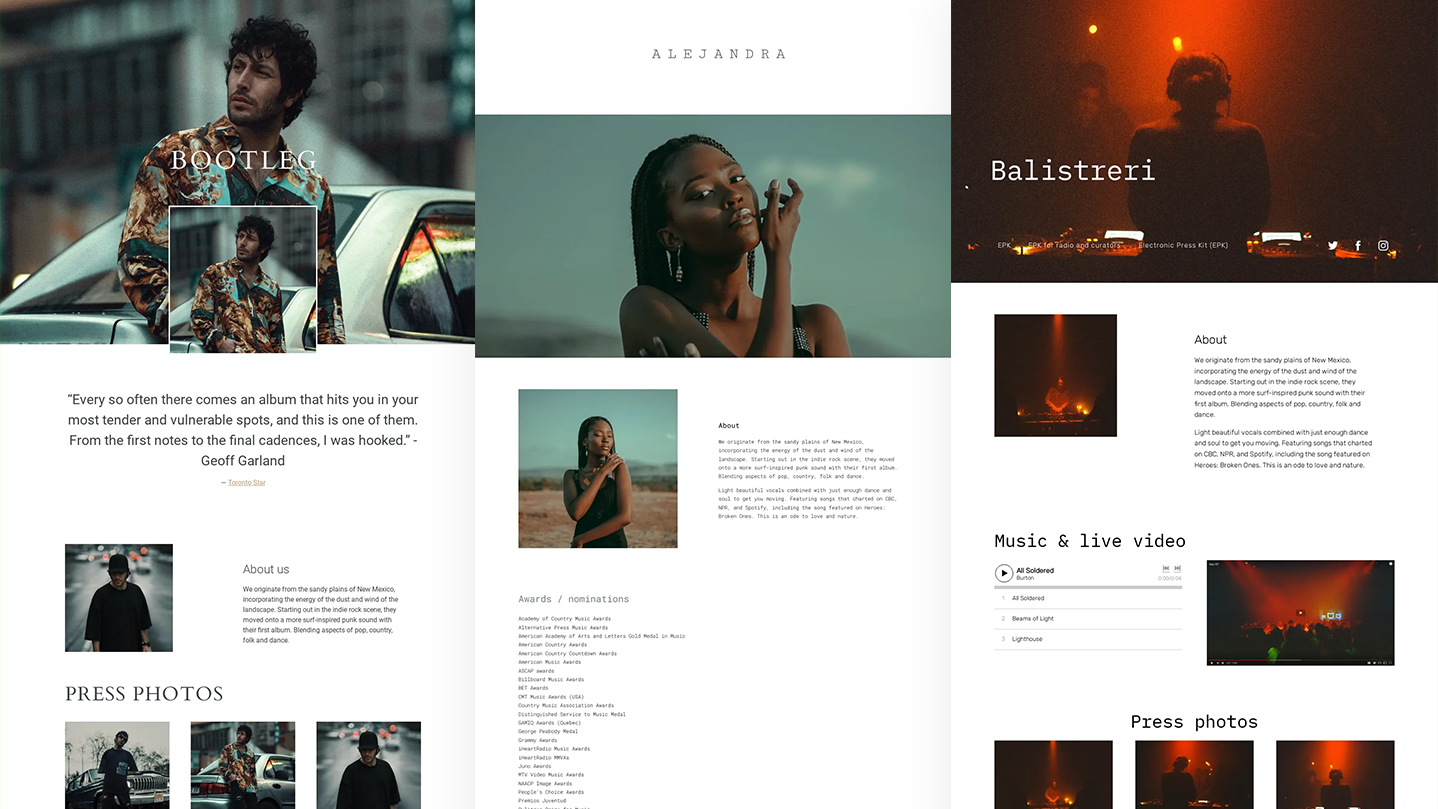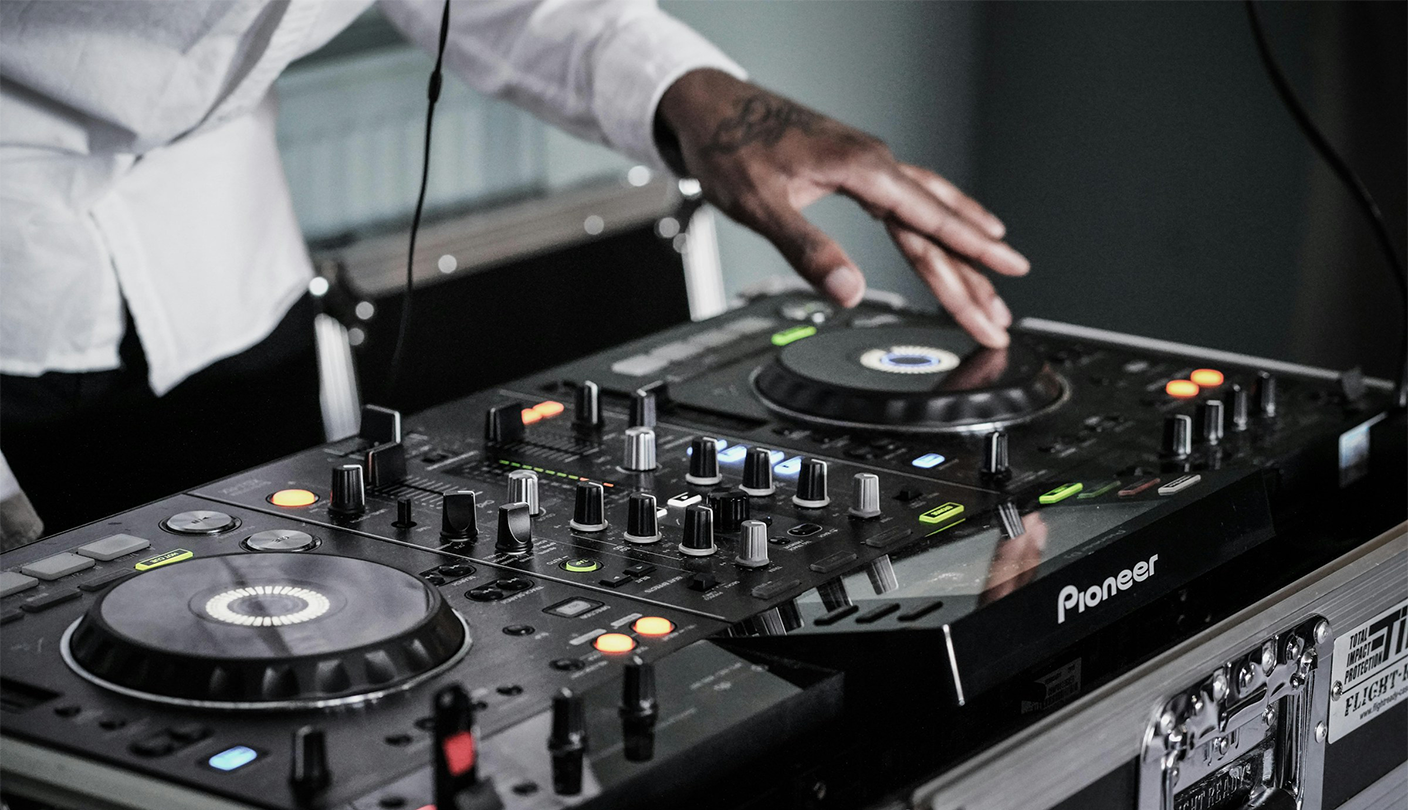You may have heard that every artist needs an EPK, but wondered what exactly an EPK includes. If that’s the case, you’re in the right place: in this post we’ll take a look at what an EPK is, what an EPK includes, and how to best create an EPK that will help you promote your music.
What is an EPK?
EPK stands for “electronic press kit.” This is a digital version of a package that musicians used to send out by mail to apply for festivals, get press for music, or solicit radio play.
Nowadays you’ll send an EPK out digitally — either as a link to a page on your music website, a link to a standalone EPK page, or as a PDF file that you can design, download, and easily attach to an email.
What should an EPK include?
A basic EPK should contain your musician or band bio, music and videos, high-resolution photos, album art, along with social and streaming links. It can include other assets as well, such as a list of achievements and awards, streaming numbers, or a stage plot.
When you decide on the focus of your EPK — to promote a new single, book a tour, or advance a show — create assets that will help industry professionals understand your goal.

Create a stunning EPK for your band
Build an electronic press kit you can proudly share with industry, using templates and easy custom design tools for musicians.Create your EPK
Why do you need an EPK?
Boiling it down to a few words: to make things easy. An EPK exists to move your career ahead along the path of least resistance. People’s attention is more fleeting than ever, and you don’t want to make industry professionals dig online to find out about you. (Inside scoop: They won’t bother digging.)
Enter the EPK: your one-stop package that provides a concise and comprehensive snapshot of your music project along with a few career highlights to date. Your EPK should make it easy for industry professionals to quickly learn about your project and catch a brief overview of your career.
For example, if you’re trying to get radio play for an upcoming single, sending details about the song with a preview and a short bio will help a station manager understand your angle, and why they should program your music for airplay. This effort will take your music further than sending just a simple song link without context.
Similarly, if you’re looking to book a show, adding details that a booking agent or venue manager can easily scan for consideration will set you apart from the less inviting applications they receive, allowing them to confirm a booking for you faster. Added bonus: providing them with a professional EPK communicates that you’re serious about your music career, and that promoting your show will be uncomplicated.
Best ways to use an EPK
What can you do with an EPK? Draw from different elements to make a press kit that works for what you’re trying to achieve right now. You can create multiple EPKs over time, to accomplish different individual goals. You might need each of these use cases for an EPK at different stages in your musical career:
1. To showcase your career
The most common reason to create an EPK is to serve as a professional online resume. It’s like a CV for artists. You want to detail everything about your career to date, and update it as your music evolves.
While an EPK usually isn’t a full website, your EPK can be a page on your own artist website. That way you can draw from the content you already have posted online. Plus, it’s easily accessible to anyone who wants to learn more about you. To see what to include in a general press kit that shows off your career, check out The 8 things that should be in every band’s digital press kit.
2. To book shows
Live music remains one of the top ways for musicians to make money while promoting their releases. Still, booking shows is not always easy, and an EPK will help you stand out from the competition.
A thoughtfully-prepared EPK displays your professionalism, and also ensures that a venue owner doesn’t have to dig through a newsfeed to figure out what your live show is like. Make sure to include live video on your EPK, as well as some details about past shows (if you’ve been tracking numbers of attendees, include this important information in your EPK).
3. To advance shows
At some point in tour planning, shows are booked and the schedule’s set. If you’ve been performing for a while, you know the work of tour preparation doesn’t end there. To make each show its best, you’ll want to assist the venue in promoting your show and making the event itself run as seamlessly as possible.
To help with this, use an EPK to advance shows. Be sure to include details that a promoter or venue will need; this includes a concise bio, video, hi-res photos, a stage plot, and a list of the inputs you’ll need. This way you’re doing what you can to prevent any surprises on the day of the show, for the presenters, any sound technicians, and even yourself!
4. To offer promotional material for media
There are plenty of opportunities for musicians to get coverage by music bloggers, online reviewers, podcast programmers, and more. If you are looking to secure press, create a professional EPK that highlights content specifically for media. This typically includes press-ready images, your full album (plus artwork), and a pitch describing your latest project.
A tip for this type of EPK: a new album or release is the perfect opportunity to re-brand across all of your channels, so make sure your images and tone are consistent everywhere.
5. To get airplay
Want to connect with fans via airplay on commercial, college, and public radio? You can prepare an EPK that focuses on an upcoming release and then use your EPK link to submit the song for airplay.
With this type of EPK, you may want to have full tracks readily available for download. A ‘File List’ feature that includes downloadable links will efficiently accomplish this. And you can always password-protect your press kit, too — especially if you’re promoting your music to radio in advance of the release date.
6. To secure representation
If you’re looking to get a manager, a booking agent, or catch the attention of a label, an EPK can communicate that you’re primed for the next step in your music career development. Use the same EPK assets as always (a bio, photos, video, and so on) but tailor your EPK details to stats about followers, online streams, sold out shows, and other numbers that demonstrate your fan following.
Make sure you finetune your branding and details on your fan following to match the professional you’re contacting. Attention to detail is a must here. If you are planning to use your EPK to network at an event or conference, create and print a PDF of your press kit to carry with you, so you can offer a copy to anyone with whom you strike up a great conversation.
7. To engage your fans
Social media is the top place to engage your fans organically, and hopefully you’ve discovered the platform of your choice to interact with your biggest supporters. But you can also create an EPK as a place for fans to gather. You could add content you wouldn’t usually post on socials, like candid photos, show posters, and popular tracks or out-takes for fans to hear.
—————————————-
Ultimately, your musician EPK is like a portfolio: it should show your best work. Our top three tips to making an effective EPK are:
- gather only high-quality content;
- create your press kit with a purpose (or audience) in mind, and;
- update your press kit often.
For any goal you set to accomplish with your EPK, remember that press kits can also be made into a downloadable EPK file, which might serve you well at a conference or to send out to booking agents over email.
An effective EPK is a useful tool for any artist or musician. Now that you know what an EPK is and how helpful it can be, it’s time to add one for your own music!



